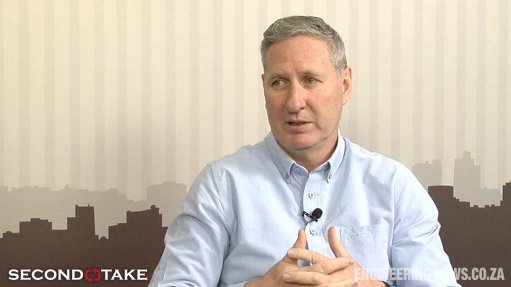Manufacturers in South Africa will adapt again in response to market dynamics, report shows
Almost all African and South African CEOs of listed manufacturing companies, or 97%, said they had changed their business models over the past five years and more than 40% expect to further change their business models over the next five years, said assurance, advisory and tax services firm PwC Africa Industrials and Services leader Pieter Theron.
PwC's 'South Africa Manufacturing Analysis 2024' report shows that the sector is resilient, with only a small decrease in overall sales, despite facing significant headwinds driven by an underperforming economy, escalating production costs and logistics disruptions.
“Key focus areas driving the industry include cost reduction, sustainability, digital transformation, automation and employee reskilling,” he said during a webinar to launch the inaugural report on October 22.
South Africa has a well-developed manufacturing sector, providing more than 1.6-million jobs and 13% of GDP in 2023.
The sector also carries weight globally with the country ranked fifty-first out of 153 countries in the UN Industrial Development Organisation (UNIDO) Competitive Industrial Performance (CIP) Index, placing South Africa within the top third of manufacturing economies globally.
Over the past year, the sector's total combined revenue declined by 2.53% and operating profits decreased across the sector by 21%. However, these figures mask the sector’s true potential.
“Based on the poor financial performance and risks identified within the industry, sustainable and cost-effective manufacturing is a key future requirement,” said PwC South Africa Smart Manufacturing lead Vinesh Maharaj.
The report determined that South African manufacturers are resolute, resilient and adaptable.
“In the adaptable portion of the report, there is a big theme around sustainability. We have seen in some of our other research that consumers are willing to pay a premium for more sustainable products. While this is not true for all LSMs [living standards measures] in South Africa, sustainable products do attract a premium and create an opportunity,” Theron noted.
Data from PwC's 'Voice of the Consumer 2024: South African Findings' report also indicates that South African consumers are willing to pay on average 11.9% higher than the average product price for sustainably produced or sourced goods.
Consumers care about sustainability and are willing to pay more for it, said PwC Africa Consumer, Industrial Products and Services industry leader Nqaba Ndiweni.
“South African industries have benefited from high carbon intensity and lower export prices, but the EU Carbon Border Adjustment Mechanism (CBAM) and similar policies will erode this advantage, leading to higher costs, lower demand and increased pressure from EU importers for carbon footprint and sustainability compliance.
“However, the CBAM also offers an opportunity for South African manufacturers because it forces them to rethink their business models and embrace a circular economy that minimises waste and maximises resource efficiency,” he said.
However, skills are the golden thread for organisational success. Manufacturing is often skills-intensive and PwC's 'Manufacturing Workforce 2023' publication highlighted the importance of creating a digitally enabled and connected workforce.
“The manufacturing sector will continue to play a significant role in the South African economy, and the sector's GDP is forecast to grow at an average rate of 5.7% a year over the next decade.
“There are significant growth opportunities available through localisation and workforce upskilling, which will boost the country's competitive advantage and attract new investment opportunities,” said Maharaj.
Sustainable manufacturing is needed to manage the triple-bottom-line of people, profit and planet. Adopting sustainable manufacturing, and particularly smart manufacturing, reduces costs and improves efficiencies.
South African manufacturing was experiencing poor financial performance on average, and cost management and efficiency could be critical to turning around financial performance, he said.
However, over the past year, manufacturers had made clear strategic decisions that supported their financial results, he added.
“Sustainable manufacturing is now a strategic business imperative. Companies no longer have a choice, owing to the ecosystem in which manufacturers operate, as well as regulations, customer choice and competition.
Further, while capital costs associated with integrating new technologies did carry risks, PwC's research indicated that the return on investment could be lucrative, including by improving efficiency and reducing costs, as well as by allowing manufacturers to make more innovative types of products and services to augment their traditional products, said Maharaj.
Skills, which were also in short supply globally, were always a challenge. However, it was not only about attracting new skills, with PwC's research indicating that a person who knew the work and was taught to use a new system was more effective than a person who only knew how to use digital solutions, he noted.
Companies needed to digitalise and adopt sustainable manufacturing methods to future-proof their businesses. They should take their workforce on their journeys as they adopted smart and sustainable work practices, he advised.
Digital transformation was reshaping the industry, enhancing efficiency, reducing costs and improving product quality. Therefore, the adoption of Industry 4.0 tools and smart factory technologies was what was needed to drive significant improvements in manufacturing efficiency and sustainability, said Theron.
“Overall, the South African manufacturing sector holds significant potential for growth and innovation, provided it can navigate the challenges and leverage the opportunities presented by sustainability, digital transformation and strategic collaboration,” he said.
Comments
Press Office
Announcements
What's On
Subscribe to improve your user experience...
Option 1 (equivalent of R125 a month):
Receive a weekly copy of Creamer Media's Engineering News & Mining Weekly magazine
(print copy for those in South Africa and e-magazine for those outside of South Africa)
Receive daily email newsletters
Access to full search results
Access archive of magazine back copies
Access to Projects in Progress
Access to ONE Research Report of your choice in PDF format
Option 2 (equivalent of R375 a month):
All benefits from Option 1
PLUS
Access to Creamer Media's Research Channel Africa for ALL Research Reports, in PDF format, on various industrial and mining sectors
including Electricity; Water; Energy Transition; Hydrogen; Roads, Rail and Ports; Coal; Gold; Platinum; Battery Metals; etc.
Already a subscriber?
Forgotten your password?
Receive weekly copy of Creamer Media's Engineering News & Mining Weekly magazine (print copy for those in South Africa and e-magazine for those outside of South Africa)
➕
Recieve daily email newsletters
➕
Access to full search results
➕
Access archive of magazine back copies
➕
Access to Projects in Progress
➕
Access to ONE Research Report of your choice in PDF format
RESEARCH CHANNEL AFRICA
R4500 (equivalent of R375 a month)
SUBSCRIBEAll benefits from Option 1
➕
Access to Creamer Media's Research Channel Africa for ALL Research Reports on various industrial and mining sectors, in PDF format, including on:
Electricity
➕
Water
➕
Energy Transition
➕
Hydrogen
➕
Roads, Rail and Ports
➕
Coal
➕
Gold
➕
Platinum
➕
Battery Metals
➕
etc.
Receive all benefits from Option 1 or Option 2 delivered to numerous people at your company
➕
Multiple User names and Passwords for simultaneous log-ins
➕
Intranet integration access to all in your organisation


















